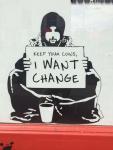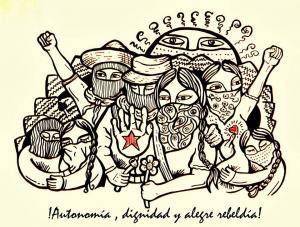Current IssueFrom the Editors
In this issue we are proud to present a previously unpublished lecture by C.L.R. James, the noted Afro-Caribbean Marxist intellectual. His discussion of Oliver Cox’s book Caste, Class, and Race, first published in 1948, brings an historic Black socialist voice to illuminate some of the issues that face our own times and the demand that Black Lives Matter. Washington and Moscow: Halt the Bombing and Stop Supporting Dictators in the Middle East!
A Discussion of the Sanders CampaignWinter 2016
Bernie Sanders and the Dilemma of the Democratic “Party”
The Sanders Campaign and the Left
Symposium on InequalityWinter 2016Introduction
Inequality has become a defining issue of our time, with political commentators of all stripes discussing its causes, effects, and possible solutions. Thomas Piketty’s 2013 work, Capital in the Twenty-First Century, set off a chain reaction of books, journal articles, conferences, and debates focusing on questions of inequality. We intend to push this critique further. The Systemic EdgeAn Interview with Saskia Sassen
The Rise of the Servant Society
Debt, Underemployment, and CapitalismThe Rise of Twenty-First-Century Serfdom
The Roots of the Modern Housing Crisis
Introduction
In 1971 the Institute of the Black World (IBW) was at a crossroads. Founded in 1969 by historian Vincent Harding, literary scholar Stephen Henderson, and other scholars in the colleges that comprised the Atlanta University Center (AUC), as well as with the support of leading national researchers of the African American experience, the IBW served as the intellectual wing of the Martin Luther King Center. The Class Basis of the Race Question in the United States
Turkey, Kurdistan, and RojavaWinter 2016Prospects for TurkeyA Historical Perspective
A Commune in Rojava?
The Kurds, Bookchin, and the Need to Reinvent Revolution
Who Wins From “Climate Apartheid”?African Climate Justice Narratives About the Paris COP21
Wealth Extraction, Governmental Servitude, and Social Disintegration in Colonial Puerto Rico
Podemos and the 15M Language Community
Radical Art: Art Young and the Cartoons of American Socialism
Social Capital and Class
The American Dream, that fantasy of growth that has long girded the ideology of entrepreneurship and a better future, is in crisis. Many haven’t felt the dream for decades, some never having experienced it at all. Robert Putnam, in his latest work, Our Kids, seeks to confront this stagnation in our economic dreams by interrogating the forces that have taken hold of communities across the United States. An Insider’s Look at What it Takes to Get By
In 2001, Professor Danny Dorling wrote an essay entitled “Anecdote Is the Singular of Data.” In it he explored how, during his teenage years, he grasped the idea that the places people live impact the lives they lead. Dorling opens the essay by describing a pedestrianized subway near his childhood home. The subway had four entrances, each leading from a different housing development. Who’s in Charge?The Power Structure and Foreign Policy
The godfather of macro-level power structure research in the United States was the sociologist C. Wright Mills, author of The Power Elite (1956). What Is This Thing Called Leninism?
First, allow me to come clean: I count Paul Le Blanc as a friend and comrade and am in his debt—along with Peter Hudis, author of Marx’s Concept of the Alternative to Capitalism (Haymarket, 2013)—for inviting me to join the editorial board of the Complete Works of Rosa Luxemburg being published by Verso Books. And I am in agreement with many of the positions on politics and historical matters that Le Blanc expresses in Unfinished Leninism. The Intelligent Human’s Guide to Socialism
This is the book many socialists have been waiting for, although we probably didn’t know it. In just over 150 pages it describes the core socialist ideas in a clear, highly accessible way. The fact that the book is frequently laugh-out-loud funny makes it even better. Socialism … Seriously is written for people who are new to socialism and want to find out what it’s all about. The first question about a book that sets out to explain socialism is, of course, what the author means by socialism. The Party of “Peace and Justice”
First, full disclosure: I read most of Jack Ross’s The Socialist Party of America in draft. Although it is normally not good policy to then review the book, I felt I could express my respect for what Jack Ross is attempting and share my concerns in a way that could serve a useful purpose. A Bottom-Up History, Not a Comfortable Reinforcement
Agustín Guillamón is a dedicated anarcho-syndicalist activist whose partisanship has not affected his critical sensitivities nor prevented him from graphically outlining what he regards as the errors and inconsistencies of the Spanish libertarian left. Happiness Is PoliticalWilliam Thompson’s Utilitarian Argument for Democratic Work
”Happiness is political,” is the opening line of Kaswan’s provocative book on William Thompson’s theory on the social nature of happiness and its ramification for organizing a just society. Kaswan introduces the reader to Thompson (1775-1833) as “perhaps the paradigmatic case of a traitor to his class.” Thompson was the only son of a wealthy merchant in Cork, Ireland; however as a political theorist, he developed ideas of the Enlightenment in a liberatory direction, calling for the elimination of subordination in all its manifestations. |
Blogs & On-Line Features“Embrace of the Serpent”: The Continuing Conquest
‘Dalit movement has to see itself as part of a class-wide movement’
Reservation is an issue that only affects a small proportion of Dalits, says sociologist Vivek Chibber. The ferment on campuses across the country following Rohith Vemula’s suicide and the recent crackdown on free speech at Jawaharlal Nehru University have drawn international attention, with many academics, students and activists across the world expressing solidarity. Long Live the Syrian Revolution!
When the head of al-Nusra declared back in November that the Free Syrian Army didn't exist, journalist Rami Jarrah went to north Aleppo and asked people what they thought about that and found that despite the claims of al-Nusra and some leftists who should know better, the FSA was still around. Berta Cáceres: ‘We are being targeted’
“We are being targeted for contract killing ordered by the judiciary and the armed forces. Our lives are hanging by a thread.” Sandy Boyer, International Socialist, R.I.P.Determination in the Cause of Justice
[Sandy Boyer, a veteran socialist, radical journalist and treasured contributor to Socialist Worker and New Politics (see his review in our current issue), died last month after a short illness. Joan McKiernan, a longtime comrade and friend, offered this tribute to Sandy that speaks so well for all of us at NP and SocialistWorker.org.] SANDY BOYER, socialist fighter, died last week. His death is a loss to all the working-class struggles and the social justice movements in the U.S., Ireland and, indeed, the world that he was involved in. Whether it was Teamsters or teachers in the U.S., political prisoners in Ireland, Puerto Rican independence activists, Palestinian solidarity campaigners or the Black Lives Matter movement, Sandy was tirelessly exercising his brilliant organizing skills on their behalf. Navigating The StormCountering the Confederate "Spring": the Assault on Black Political Power in Jackson, MS

The racist and utterly reactionary Republican legislative majorities that dominate the South are on an aggressive march this legislative session. From Texas to Florida, Arkansas to Virginia, and all the states in-between, they are employing cut-throat strategies and tactics to pass a package of regressive, exploitative and outright anti-human legislation drawn up by the likes of ALEC (the American Legislative Exchange Council)[1] and other right-wing think tanks. They are attacking the right to vote, Black voting districts, the right to education, access to housing, workers rights to organize themselves, wage protections, alternative energy plans, marriage equality, and the list goes on.
France's New Anti-Capitalist Party, Seven Years Later: Project, Reality, Questions
The following piece was written for Kojkkino, the theoretical magazine of the Greek organization DEA. Though quite long, it does not claim to cover all sides of the question. Indeed, it’s the kind of article that is never really finished and that has to be constantly reworked and supplemented. Its main objective is to stimulate collective thinking about the lessons of the successes and failures of the NPA from its birth to the present day. Radical Left organizations in Europe have tended to focus their attention on the major political and electoral experiences that have stood out in the recent period – beginning with Syriza in Greece, Podemos in the Spanish State and the Left Bloc in Portugal, and often also including Die Linke in Germany, Rifondazione Comunista in Italy, the Red-Green Alliance in Denmark (RGA) and others. This is entirely justified. Still, other attempts at “doing something new” merit analysis, even where their successes were fewer or shorter-lived. They provide food for thought about a broader range of national contexts. Drugs, War, and Capitalism
Dawn Paley. Drug War Capitalism. Oakland: AK Press, 2014. Notes. Index. Dawn Paley’s Drug War Capitalism presents an overview of the drug wars in several Latin American countries: Columbia, Mexico, Guatemala, and Honduras. Mexico receives the most attention, and Paley provides a wealth of information from a variety of sources documenting the impact of the war-on-drugs on Mexican society and on the role of the United States. She focuses especially on the relationship between the drug business, government policies, and the militarization of Latin American societies, elucidating the role of U.S. policies such as Plan Mérida. She demonstrates the nefarious part played by the U.S. government’s overall structuring of both the drug market and the drug war by elaborating on both the military and civilian aspects of U.S policy in an attempt to prove her thesis, which is the war on drugs forms part of a plan—or if not a plan at least a process—that furthers capitalism, especially its expansion “…into new or previously inaccessible territories and social spaces.” (p. 15) Paley’s book contributes to, but does not resolve the debate over the relationship between drug dealers, capitalism, and the state.
Help Needed to Produce Rosa Luxemburg's Complete Works
The effort to issue The Complete Works of Rosa Luxemburg has reached a critical phase, and we appeal for your help in enabling future volumes to be published. The Complete Works was inaugurated in March 2011 with the 600-page Letters of Rosa Luxemburg, the largest collection of her correspondence ever published in English. Volume I of the Complete Works, entitled Economic Writings 1, was published in 2013 and contains the first full English translation of one of her most important books, Introduction to Political Economy, as well as eight newly-discovered manuscripts on anthropology, economic history, and the theory of crises. Volume II, entitled Economic Writings 2, was published in 2015 and contains a new translation of The Accumulation of Capital and the Anti-Critique. #FeelTheBe…trayal?
A while ago, I wrote a piece here that, among other things, argued that if Bernie Sanders were to lose the Democratic primary he should not, as he has promised several times to do, support Hillary Clinton for President. Many people on the Left, most recently Chris Hedges in an article for Truthdig, have argued that this promise makes Sanders a wolf-in-sheep’s clothing for the Left, and that he will inevitably betray the movement supporting him and the ideals he has campaigned on. For Hedges and others, this promise (along with running as a Democrat) is precisely why the Left should not be supporting Sanders and his campaign at all. While I disagree with Hedges that we should not support Sanders because of this promise, we should absolutely be wary of the likely possibility that he will keep this terrible promise; Sanders if anything has a tendency to keep his word. This is what he is known for, after all—being the rare honest politician. Liberal Red-Baiting
The Sanders campaign has certainly sharpened the contradictions, hasn’t it? It’s been very clarifying to see Hillary Clinton and her surrogates running against single-payer and free college, with intellectual cover coming from Paul Krugman and Vox. Expectations, having been systematically beaten down for 35 years, must be beaten down further, whether it’s Hillary saying that to go to college one needs some “skin in the game,” or Rep. John Lewis reminding us that nothing is free in America. A challenge from the left has forced centrist Democrats to reveal themselves as proud capitalist tools. Fernando Cardenal, Nicaraguan Christian Revolutionary– Presente!
Fernando Cardenal, the revolutionary Jesuit priest who served as Secretary of Education in the Sandinista government of Nicaragua, died in Managua on February 20 following complications arising from heart surgery. He was 82 years old. Cardenal, joined the Sandinista Front for National Liberation (FSLN) before the Nicaraguan revolution of 1979, having been like his brother the poet Ernesto Cardenal, also a priest, recruited by top Sandinista leaders. Cardenal played a key role in the 1970s, before the revolution, in building the Christian Revolutionary Movement and after the revolution he was the leader and organizer of the National Literacy Campaign. When in 1984 Pope John Paul II insisted that the Cardenal leave the Sandinista government, he refused, writing that he could not believe that God would want him to stop serving the poor. In the early 1990s Cardenal broke with Daniel Ortega’s increasingly authoritarian Sandinista government, returned to the Jesuit order in 1997, and continued his work among the poor.
Let Them Drink Salt Water
“Emphasizing with serious concern the urgent need to address the significant gap between the aggregate effect of Parties’ mitigation pledges in terms of global annual emissions of greenhouse gases by 2020 and aggregate emission pathways consistent with holding the increase in the global average temperature to well below 2 °C above preindustrial levels and pursuing efforts to limit the temperature increase to 1.5 °C above pre-industrial levels” - Paris Agreement, 21st Session of the Conference of the Parties The Stockholm Resilience Center, an internationally recognized research center on sustainability, considers Earth to have nine planetary boundaries. Staying within these boundaries is key to species survival and ecological sustainability. One of the boundaries is climate change, which is forecasted to produce high global sea level rise. The effect will be that coastal life in general for the species will be highly degraded. Can a Woman Worker Become Mayor of Juarez, Mexico?
A former line worker at a border assembly plant, or maquiladora, Hinojos does not have the infrastructure of a political party, lacks money to pay signature collectors and is missing the endorsements of influential people and media outlets. The San Andrés Accords--Twenty Years Later
Twenty years ago the Mexican government signed the San Andrés Accords Regarding the Rights and Culture of the Indigenous that granted autonomy to Indian communities. Yet today, some argue that the indigenous people of Mexico, who represent about 10 to 15 percent of the population of the country, are worse off than they were then. What happened and where are things now?
|

 Outside powers have had a long and shameful history of cynically supporting dictatorships in the Middle East because maintaining friendly autocratic states in the region suits their geopolitical objectives. And today those criminal policies are flagrantly on display.
Outside powers have had a long and shameful history of cynically supporting dictatorships in the Middle East because maintaining friendly autocratic states in the region suits their geopolitical objectives. And today those criminal policies are flagrantly on display.  The Bernie Sanders campaign in the Democratic Party has attracted the support of millions, raised an economic reform program such as we have not seen in decades, and has led to a national discussion about the nature of socialism. At the same time, he has ceased to be an independent, has joined the Democratic Party, and has promised to support its nominee, in all likelihood Hillary Clinton. This has led to much discussion and debate on the left. New Politics has solicited two articles from different points of view on the Sanders campaign, one by our co-editor Jason Schulman and the other by Lance Selfa and Ashley Smith of the International Socialist Organization.
The Bernie Sanders campaign in the Democratic Party has attracted the support of millions, raised an economic reform program such as we have not seen in decades, and has led to a national discussion about the nature of socialism. At the same time, he has ceased to be an independent, has joined the Democratic Party, and has promised to support its nominee, in all likelihood Hillary Clinton. This has led to much discussion and debate on the left. New Politics has solicited two articles from different points of view on the Sanders campaign, one by our co-editor Jason Schulman and the other by Lance Selfa and Ashley Smith of the International Socialist Organization. Some months ago I responded to a piece that appeared on the New Politics blog by my longtime fellow NP editorial board member and friend Barry Finger.1 In my own blog, I argued that Barry had a better, more sophisticated understanding of the peculiarities of the Democratic Party and the U.S.
Some months ago I responded to a piece that appeared on the New Politics blog by my longtime fellow NP editorial board member and friend Barry Finger.1 In my own blog, I argued that Barry had a better, more sophisticated understanding of the peculiarities of the Democratic Party and the U.S. Senator Bernie Sanders’ run for the Democratic Party nomination for president has certainly energized thousands. It has also rekindled an old debate on the American left that revolves around the question: Should the left join, endorse, support, or work for campaigns in the Democratic Party?
Senator Bernie Sanders’ run for the Democratic Party nomination for president has certainly energized thousands. It has also rekindled an old debate on the American left that revolves around the question: Should the left join, endorse, support, or work for campaigns in the Democratic Party? SASKIA SASSEN is the Robert S. Lynd Professor of Sociology at Columbia University (www.saskiasassen.com). She was interviewed for
SASKIA SASSEN is the Robert S. Lynd Professor of Sociology at Columbia University (www.saskiasassen.com). She was interviewed for  We are witnessing a grand shift in the nature of capitalist society. It is not to be found simply in the expanding chasms of economic inequality, nor in the rapid social and cultural transformations shaped by globalization. Of course, economic inequality raises concern among liberals, social democrats, and socialists alike. For all see in it an ethical problem, one of unfairness, of greed, of unequal control and power.
We are witnessing a grand shift in the nature of capitalist society. It is not to be found simply in the expanding chasms of economic inequality, nor in the rapid social and cultural transformations shaped by globalization. Of course, economic inequality raises concern among liberals, social democrats, and socialists alike. For all see in it an ethical problem, one of unfairness, of greed, of unequal control and power. Systemic contradictions of capitalism have only intensified in the neoliberal era. Structural unemployment, a phenomenon directly related to capitalist modes of production, has continued unabated, creating a massive and ever-growing “reserve army of labor” that has been disenfranchised on an unprecedented scale.
Systemic contradictions of capitalism have only intensified in the neoliberal era. Structural unemployment, a phenomenon directly related to capitalist modes of production, has continued unabated, creating a massive and ever-growing “reserve army of labor” that has been disenfranchised on an unprecedented scale.  Americans today face a dual crisis: rising rents and increasingly unaffordable housing markets. The housing crisis, far from being over, has metastasized.
Americans today face a dual crisis: rising rents and increasingly unaffordable housing markets. The housing crisis, far from being over, has metastasized. Now as usual, ten past nine; I certainly will not go on beyond ten past ten. And I would like to say at once that this is the task. It is so difficult that it is as well to say at the beginning that it can be done. Five hundred and eighty-three pages [Oliver Cox’s Caste, Class and Race: A Study in Social Dynamics].
Now as usual, ten past nine; I certainly will not go on beyond ten past ten. And I would like to say at once that this is the task. It is so difficult that it is as well to say at the beginning that it can be done. Five hundred and eighty-three pages [Oliver Cox’s Caste, Class and Race: A Study in Social Dynamics]. In a June 2015 election, the new People’s Democracy Party (HDP) of Turkey passed a highly undemocratic 10 percent threshold to enter the Turkish parliament.
In a June 2015 election, the new People’s Democracy Party (HDP) of Turkey passed a highly undemocratic 10 percent threshold to enter the Turkish parliament. The siege of Kobani by Islamic State (ISIS) brought worldwide attention to the Syrian Kurdish PYD (Partiya Yekîtiya Demokrat, Democratic Union Party), the leading force in the Kurdish-majority areas in northern Syria. The PYD calls this region Rojava—literally meaning “land of the sunset” but also translated as “West Kurdistan.”
The siege of Kobani by Islamic State (ISIS) brought worldwide attention to the Syrian Kurdish PYD (Partiya Yekîtiya Demokrat, Democratic Union Party), the leading force in the Kurdish-majority areas in northern Syria. The PYD calls this region Rojava—literally meaning “land of the sunset” but also translated as “West Kurdistan.”  Today, a year after the heroic resistance of Kobani made it to the world news, it is hardly necessary to give an introduction to the Kurdish struggle, which has now taken a central place in the imagination of the international left, both vanguardist and anti-authoritarian.
Today, a year after the heroic resistance of Kobani made it to the world news, it is hardly necessary to give an introduction to the Kurdish struggle, which has now taken a central place in the imagination of the international left, both vanguardist and anti-authoritarian. The billion residents of Africa are amongst the most vulnerable to climate change in coming decades, and of special concern are high-density sites of geopolitical and resource-related conflicts: the copper belt of the Democratic Republic of the Congo and mineral-rich African Great Lakes stretching into northern Uganda, western Ethiopia (bordering the Sudanese war zone), Madagascar and s
The billion residents of Africa are amongst the most vulnerable to climate change in coming decades, and of special concern are high-density sites of geopolitical and resource-related conflicts: the copper belt of the Democratic Republic of the Congo and mineral-rich African Great Lakes stretching into northern Uganda, western Ethiopia (bordering the Sudanese war zone), Madagascar and s After ten years of economic contraction, many of the citizens of Puerto Rico find themselves watching the secular decomposition of a reality that in its heyday was painted by many as one of relative socio-economic welfare.
After ten years of economic contraction, many of the citizens of Puerto Rico find themselves watching the secular decomposition of a reality that in its heyday was painted by many as one of relative socio-economic welfare. The Indignados (in English, the “outraged”), protagonists of what is called the Spanish May 15, or 15M, Revolution (2011-2013), concentrated a great deal of their political action on the construction of a shared conceptual and emotional understanding of the political reality around them.
The Indignados (in English, the “outraged”), protagonists of what is called the Spanish May 15, or 15M, Revolution (2011-2013), concentrated a great deal of their political action on the construction of a shared conceptual and emotional understanding of the political reality around them. Arthur Henry Young (1866-1943), known to the world as Art, was arguably the most widely recognized and beloved cartoonist in the history of American radicalism. A working cartoonist for sixty years, Art Young drew thousands of simple black-line drawings with biting captions that appeared in big-city newspapers, liberal magazines, and, most importantly, in the socialist, labor, and radical press of the early twentieth century.
Arthur Henry Young (1866-1943), known to the world as Art, was arguably the most widely recognized and beloved cartoonist in the history of American radicalism. A working cartoonist for sixty years, Art Young drew thousands of simple black-line drawings with biting captions that appeared in big-city newspapers, liberal magazines, and, most importantly, in the socialist, labor, and radical press of the early twentieth century. Will we ever get over this thing called civilization? That's what I wondered as I watched
Will we ever get over this thing called civilization? That's what I wondered as I watched 













 The editorial board of
The editorial board of